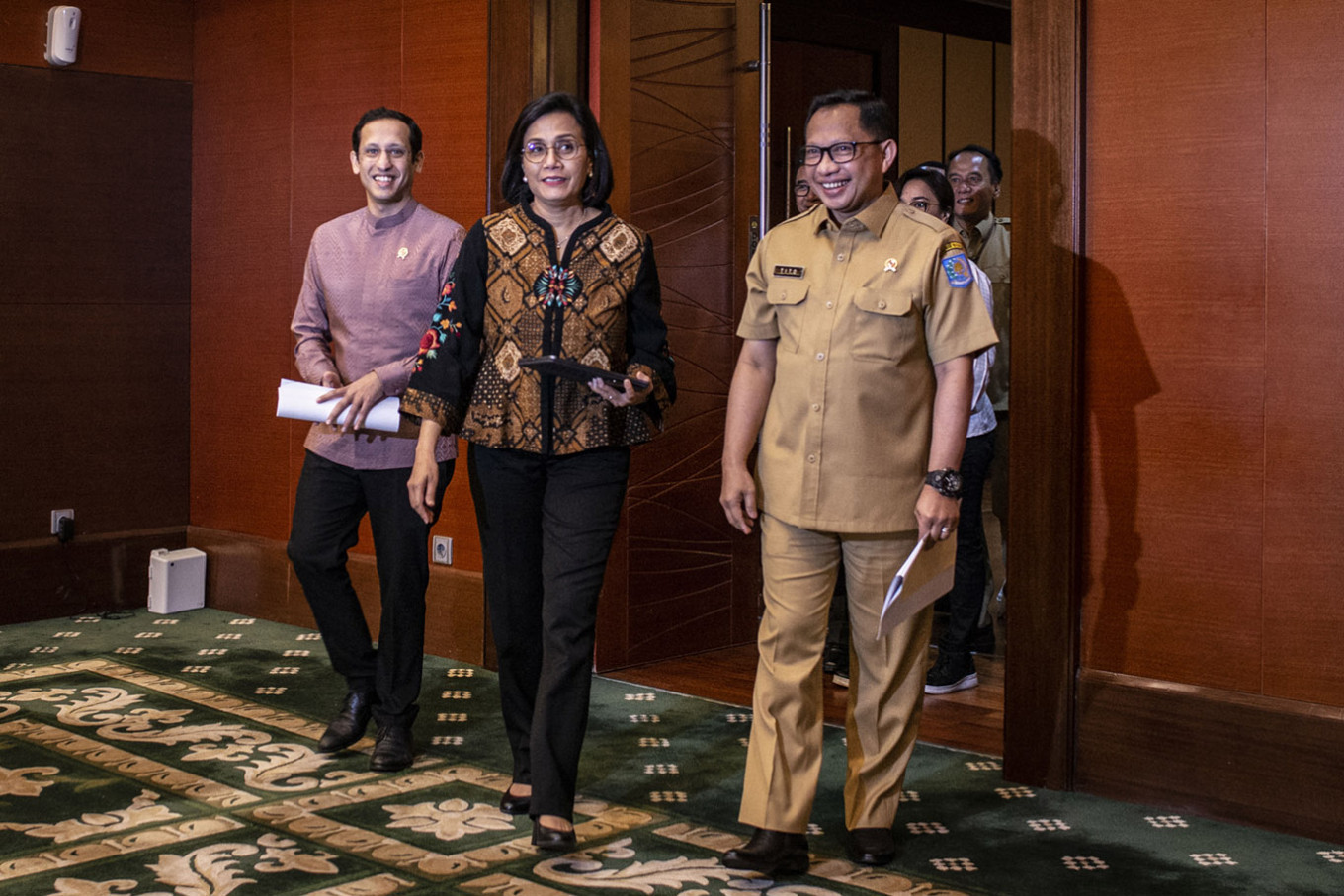Popular Reads
Top Results
Can't find what you're looking for?
View all search resultsPopular Reads
Top Results
Can't find what you're looking for?
View all search results‘Desperate times, desperate measures’: Calls grow for flexible state budget amid virus
University of Indonesia rector Ari Kuncoro said the state budget would need to be flexible to solve health issues and counter the negative economic effects of the virus.
Change text size
Gift Premium Articles
to Anyone
 Finance Minister Sri Mulyani (‘center’), Minister of Education and Culture Nadiem Makarim (‘left’) and Minister of Home Affairs Tito Karnavian (‘right’) prepare to give a press conference on “synergy” in managing School Operational Assistance Funds (BOS) and Performance-Based Village Funds at the Ministry of Finance in Jakarta on Feb. 10. (Antara/Aprillio Akbar )
Finance Minister Sri Mulyani (‘center’), Minister of Education and Culture Nadiem Makarim (‘left’) and Minister of Home Affairs Tito Karnavian (‘right’) prepare to give a press conference on “synergy” in managing School Operational Assistance Funds (BOS) and Performance-Based Village Funds at the Ministry of Finance in Jakarta on Feb. 10. (Antara/Aprillio Akbar )
T
he government should brace for the possibility of a state budget deficit surpassing the self-imposed limit of 3 percent of the gross domestic product as it allocates a billions of dollars to cushion the economic impacts of the COVID-19 pandemic, economists say.
University of Indonesia rector Ari Kuncoro said the state budget would need to be flexible to solve health issues and counter the negative economic effects of the virus, adding that the government should opt to substitute the annual budget with an intertemporal budget.
“Desperate times call for desperate measures,” the senior economist told The Jakarta Post on Thursday. “The government should look to implement an intertemporal budget. If we pass the 3 percent limit this year, then we should compensate for the deficit over the next three to five years.”
The current annual budget system will limit the government’s ability to maneuver nimbly at a time when a stimulus is most needed, Ari said. “But the stimulus must focus on healthcare and making the economy work, particularly through online platforms.”
Read also: State budget deficit may pass 3 percent ceiling if situation gets worse, analyst warns
Indonesia recorded a state budget deficit of Rp 62.8 trillion (US$4.07 billion) in February of this year as government spending growth slowed compared to the same period the year before and revenue dropped, the Finance Ministry announced on Wednesday.
At the same time, the country is allocating Rp 120 trillion from this year’s state budget for stimulus packages to contain the negative economic effects of the COVID-19 pandemic. As of Wednesday, Indonesia had confirmed 227 cases of the virus and 19 deaths. Globally, the pneumonia-like illness has infected over 219,000 people and taken at least 8,900 lives.
Finance Minister Sri Mulyani Indrawati has said the state budget deficit may widen to between 2.2 and 2.5 percent of GDP this year, taking into account the large government stimulus packages to fuel the virus-worn economy.
Total state revenue collected by late February was Rp 216.6 trillion, a 0.5 percent year-on-year (yoy) contraction, while state spending reached Rp 279.4 trillion, up by 2.8 percent yoy, ministry data shows. The annual growth rate in state spending has slowed from 9.2 percent in February 2018.
She added that the assumptions underpinning the 2020 budget had changed as a result of the pandemic, which would weigh heavily on the Indonesian and world economies. The transformed assumptions included economic growth, the inflation rate, the exchange rate and oil prices, among other factors.
“There was hope that the economy would grow better this year, but COVID-19 has changed economic activities, and now we are alert to its impact on the state budget,” Sri Mulyani said.
Read also: 'File your tax returns': Tax office intensifies efforts to collect taxes as budget burdens multiply
Sri Mulyani said the government would reallocate up to Rp 10 trillion from the portion of the state budget set for ministries and institutions as well as Rp 17.2 trillion in funds earmarked for regional administrations to fund the country’s healthcare system as it copes with the rising number of COVID-19 cases.
Bank Permata economist Josua Pardede told the Post that the government may need “far more funds” to counter rising rates of infection and the virus’ economic impact on workers.
“With the planned stimulus, combined with the 2.5 percent budget deficit projection, the government still has room for Rp 52 trillion to Rp 69 trillion if they need to take more drastic measures,” Josua said, calling on the government to prioritize the healthcare system and cash transfers to low-income households.
Senior economist Faisal Basri wrote on his twitter account, @FaisalBasri, on Tuesday that the government should halt construction of its new capital and reallocate the energy and funding to "unite all the nation's power".
"To save Indonesia, the President has to immediately declare an emergency war against the coronavirus. That is also the key to save the economy," Faisal wrote.









